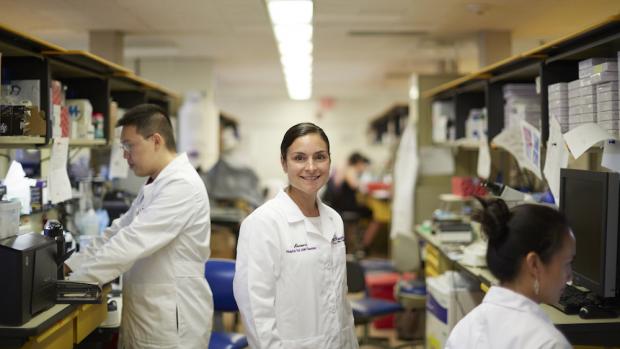Honoring Women in STEM: Alesha Castillo
Forging a path to speed up the healing process in bone injuries

In the Castillo Laboratory for Mechanobiology and Regenerative Medicine at the NYU Tandon School of Engineering, Assistant Professor Alesha Castillo conducts cutting-edge research in skeletal mechanobiology and regeneration, investigating mechanisms that trigger the release of mechanochemical signals from bone cells which control skeletal stem cell function. With the ultimate goal of repairing injured bone tissue, Castillo’s findings could have an incredible impact on orthopaedic rehabilitative medicine by speeding up the healing process in bone injuries sustained by combat troops and veterans, or strengthening tissue in the aging population.
Collaborating daily with orthopedic surgeons, tissue engineers, chemical engineers, and developmental biologists, Castillo’s research brings together the medical and engineering communities to “tackle the problems and challenges within medicine.” Crossing these boundaries between disciplines is at the heart of Castillo’s research, so it comes as no surprise that one of her more recent projects was in virtual reality. Through the Tandon VR app’s immersive experience, Tandon Labs, which just debuted at SXSW, anyone can virtually step into Castillo’s lab at a colorfully, microscopic level to watch bone cells control angiogenesis, the process by which new blood vessels form.
Castillo’s initial curiosity into skeletal mechanobiology stemmed from her personal experience as a runner suffering from a stress fracture. “I thought it would be interesting to determine how to heal stress fractures, which was becoming a major focus of the military and for elite athletes.” After completing her postdoctoral training at Indiana University, Castillo astutely recognized the potential of regenerative medicine. “Now, the field is evolving so quickly. The key is to find those gaps that nobody else is working in,” Castillo emphasized.
As a director of her own laboratory, and a jointly appointed faculty member in Mechanical Engineering at NYU Tandon School of Engineering and Orthopaedic Surgery at NYU School of Medicine, Castillo is at the forefront of her field. Yet, she vividly remembers being one of three women in her undergraduate engineering courses. More women are now entering STEM through academia and industry positions, Castillo noted, but “if you look at the leadership roles within engineering, they are still predominantly filled by men.” The difficulty young female students and faculty members face when seeking out established female mentors in their fields is one Castillo consistently recognizes.
Her advice to students? Participate in initiatives, like Tandon’s Women in Engineering, which supports and creates networking communities for women engineers. The critical next step is determining the mentors in their own area of study and expertise. “It is extremely important for young women to find people within their specific professional communities, who can help them navigate that community and introduce them to others in that space.”
Camila Ryder
Graduate School of Arts and Science
Master of Arts in English Literature, Class of 2018




